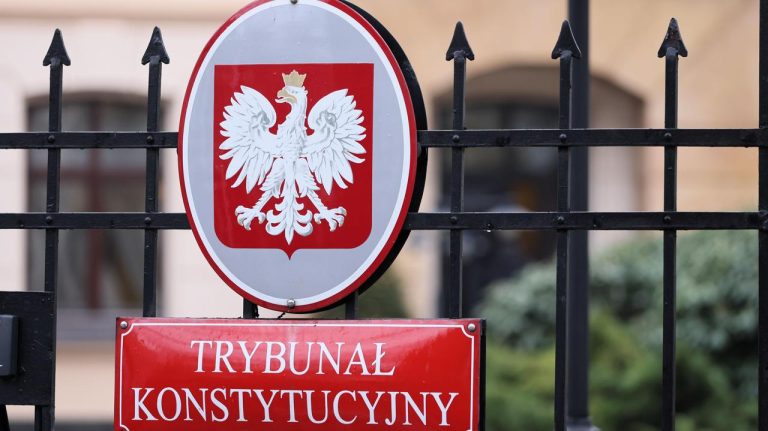The Constitutional Court considered the release of Dariush Barski from the post of national prosecutor against the Constitution. The spokesperson of the General Prosecutor's Office and the National Prosecutor's Office explained this sentence and said that this sentence “raises certain doubts in the context of the scope of this decision”. Prosecutor Anna Adamiak also noted that the jury included two judges who were excluded by law.
On Friday, the Constitutional Court ruled that the dismissal of Dariush Barski from the position of national prosecutor in January of this year by the Prosecutor General was unconstitutional and limited his access to public service.
The tribunal – following the constitutional appeal of Dariusz Barski on January 15 – issued a verdict in a panel of five judges headed by Kristina Pavlovic. Speaker was Stanislav Piotrovich. The team also included Zbigniew Jedrzejewski, Bartlomiej Sochanski and Rafal Wojciechowski. The decision was not unanimous.
Prosecutor Adamiak: The decision raises some doubts
The decision was explained at the conference by the spokesperson of the General Prosecutor's Office and the National Prosecutor's Office, Judge Anna Adamiak, noting that “each judicial body in Poland has its own jurisdiction.” – The Constitutional Court also has its jurisdiction or jurisdiction. The Constitutional Court decides on the constitutionality or lack of laws and other legal acts, but the condition is that the Constitutional Court can consider a citizen's appeal, as every Polish citizen has such a right, the citizen is aware. and is convinced that his rights have been violated, he must first complete the legal process. This is a constitutional provision as well as a provision on official pragmatics, he explained.
– Dariush Barski, when he realized that the position of the general prosecutor, which was offered to him on January 12, was groundless, violated his rights and violated the law in general, he should apply to the labor court like every citizen of this country. protection of his rights. However, the prosecutor Barski did not use this opportunity and filed a complaint with the Constitutional Court within three days, he noted.
He explained that “prosecutor Barski's complaint is not admissible under the law, precisely because (…) it cannot be considered by the Constitutional Court, because it does not meet the formal requirements in the form of non-execution of the law. judicial process and lack of final judgment issued by the court in this regard shall be completed.
On Friday, he continued, “This court issued a verdict based on Mr. Dariush Barski's request,” but “this verdict also raises some doubts about the scope of this decision.” – The jurisdiction of the Constitutional Court is to determine whether the act and other normative legal acts comply with the constitution or not. In this case, the Constitutional Court did not find that the provisions (…) are unconstitutional. He stated that the interpretation of this law, that is, the method of implementation of this provision by the Attorney General, is unconstitutional, Adamiak said.
According to the spokesman, “this clearly shows that the Tribunal exceeded its jurisdiction in its ruling.” – It is also important to include two judges, who were excluded by law, to the jury. And this is according to the law in the form of the Act of the Constitutional Court. These are the people in the legislative process that led to the adoption of the act itself, whose interpretation was questioned with their participation, he added, referring to Kristina Pavlovic and Stanislav Piotrovic.
Changes in the National Prosecutor's Office
Changes in the National Prosecutor's Office took place on January 12, 2024. On that day, Attorney General and Minister of Justice Adam Bodnar handed Dariusz Barski, who serves as the national prosecutor, a document, according to which his return to active duty in 2022 was “contrary to the current regulations and has no legal effect.” .
The act of restoring Barski from retirement was carried out on February 16, 2022 by the then Attorney General and Minister of Justice Zbigniew Ziobro, but – as the Ministry of Justice noted in January – “the provisions of this act, which are no longer in force, were used.” . The Ministry noted that the regulation in this matter – from the provisions of the introduction of the Law on the Prosecutor's Office in 2016 – has an episodic nature and is effective for two months.
As a result, as Bodnar noted, Barski's authority as the head of the PCC was invalidated due to his wrong appointment, but he was not dismissed from his position, which, according to the provisions of the Law on the Prosecutor's Office, requires the written consent of the prosecutor. the president According to the Minister of Justice, President Duda could not agree to the removal of Barski from his position, because Barski cannot “return to active service from retirement” in 2022.
According to Barski, these provisions “are still valid” because – as he wrote in the complaint – “they are part of the Polish legal system and shape the service relations of the prosecutor's office” and “in no way can these provisions be considered episodic, applied no”. only for a period of two months from the date of entry into force of this Law.
Dariusz Barski Tomas Gzell/PAP
Adam Bodnar – after Barski filed a constitutional complaint with the Constitutional Court in mid-January – sent a letter to the court in February to drop the case. Bodnar emphasized in his letter to the Constitutional Court that before filing the constitutional complaint, Barski did not use the available legal means to obtain a final verdict. “The complainant should use the means that belong to the normal process of the case and apply to the constitutional complaint on the basis of a kind of final ratio, the last chance to ensure the rights and freedoms violated by the application of unconstitutional provisions,” said Bodnar. noted.
ALSO READ: Supreme Court in Barski case. Prosecutor's office: this position has no legal effect
Main photo credit: Leszek Szymanski/PAP

